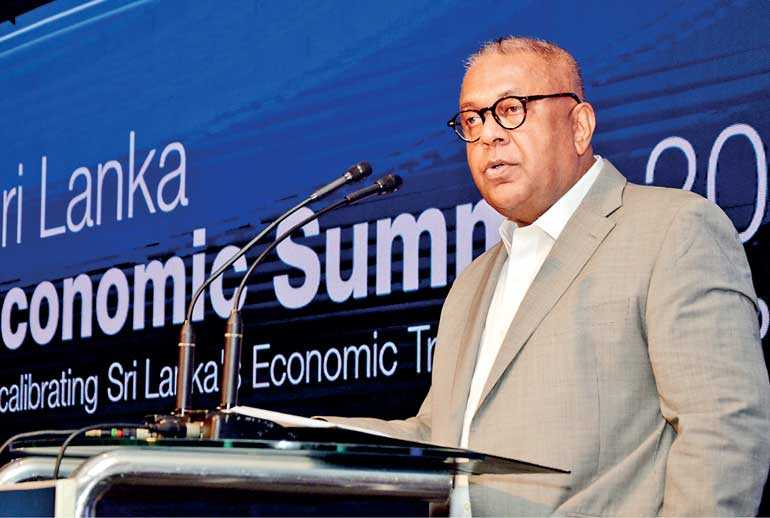Sunday Feb 15, 2026
Sunday Feb 15, 2026
Wednesday, 18 September 2019 00:00 - - {{hitsCtrl.values.hits}}

Finance Minister Mangala Samaraweera yesterday highlighted three lessons for Sri Lanka to take forward as it looks to fast-track growth, insisting true development is not possible without reconciliation, rule of law, more open markets, and de-politicisation.
Minister Samaraweera, speaking at the Sri Lanka Economic Summit 2019 titled “Re-calibrating Sri Lanka’s Economic Trajectory Towards 2025”, organised by the Ceylon Chamber of Commerce (CCC), recalled Sri Lanka’s journey since independence, and attempted to highlight where the country had deviated from the growth path, according to his view.
“The lessons of our past could not be clearer. Prosperity requires us to move even more decisively in the direction of more democracy, more reconciliation, more rule-of- law, more de-politicisation, more openness, more competition, and more reform. And I am very confident that this is the direction that Sri Lankans will choose once again,” he told the gathering.
He noted that the Summit is of greater significance this year because it is held ahead of Presidential Elections. Minister Samaraweera pointed out that if Sri Lanka is to recalibrate its future, it is essential that citizens learn from the mistakes of the past, and that this was the reason his speech was titled ‘Three Lessons from the Past to Recalibrate our Future.’ Recalling the impact that Sri Lanka’s violent past has had on growth, he highlighted the importance of reconciliation.
“Reconciliation is an absolute necessity for economic development. There is no way of harnessing our potential as a modern, stable, prosperous nation, except to celebrate the diversity of our country as a multi-ethnic, multi-religious, and multi-lingual nation.”
“Some people with short memories say they want decisive leadership. That is good. Sri Lanka needs decisive leaders. But it certainly cannot realise its economic objectives with leaders who decisively sack the Judiciary, decisively murder, decisively undermine the rule of law and cultivate a culture of impunity, decisively ignore procurement procedures for their own benefit, and decisively expropriate private investment. The previous regime’s naked power-grab – by stabbing the rule of law in the back – was a key reason for the failure of the promised post-war investment boom to materialise. Foreign and domestic businesses decided that their factories and investments would be safer in Ethiopia, Bangladesh, or Vietnam. That is lesson two. There can never be sustainable economic development without democracy and the rule of law,” he added.
Samaraweera pointed out that between 2005 and 2015, Sri Lanka did not sign a single FTA, and even though it has gathered six FTAs over the decades, it is still far behind competitors such as Thailand, which has 14, Malaysia (17), South Korea (16), and Singapore (25).
“This is one important reason for our failure to diversify exports beyond tea and apparel. We continue to export old products to old markets. That is lesson three. Our foreign policy must be based on openness and confident engagement, not defensive and protectionist posturing and arrogance. The Westphalian era is over. Globalisation means that we are inter-dependent and inter-linked. Confrontation, isolation, and dependence on a single country will not bring sustainable economic development, peace, or prosperity to our people.”
Minister Samaraweera also backed the new Monetary Law Act, insisting that it was essential to curbing excessive money printing, and expressing plans to present it before Parliament next month.
“If there is one reform that will stabilise Sri Lanka’s macroeconomy, it is Central Bank de-politicisation and independence. That is what will be done when the Monetary Law Act goes to Parliament in the next month; complemented by fiscal rules legislation, designed to prevent Sri Lanka from living beyond her means.”